Roads are clogged with motorists and buses, whose tabbaa’en hang from the bus into the street to shout routes at waiting commuters. Drivers only slow long enough for riders to leap on at a jog. Tuk-tuks careen down side-streets, the sound of radios tangling with the constant rumble of construction and the voices of street hawkers peddling everything from children’s toys and cotton candy to rare books and antiques. Dust and desert sand mix with the smog of traffic, discoloring the concrete pylons that bear the city’s weight. This is Egypt, a nation of one hundred million people. And it has one of the fastest-growing populations in the world—about half of which is concentrated in crowded semi-urban or urban areas.
But above the bustle and sweat of everyday life lie rooftop oases, where poultry and livestock have been kept for generations. The practice of raising animals on rooftops in Egypt “extends at least sixty or seventy years back,” says Noha Fikry, an Egyptian doctoral student at the University of Toronto’s Department of Anthropology who wrote her first master’s thesis on food ecologies in urban Egypt.
“It’s telling that people manage to have these pockets of life in a very dense and intense urban setting,” she says. The view from any rooftop in Cairo is a cityscape with no end. But, those who foster animals there will tell you their rooftop farms, Fikry explains, “feel like an escape from everything they are suffering.”
In Awish el-Hagar, a semi-urban area in the Nile Delta outside the city of Mansoura, about two hours north of Cairo, Amany el-Boray raises ducks, chickens and pigeons on the roof of her home with the help of her five children. El-Boray says she learned how to care for poultry from her mother, who kept birds on the rooftop of her childhood home when she was young.
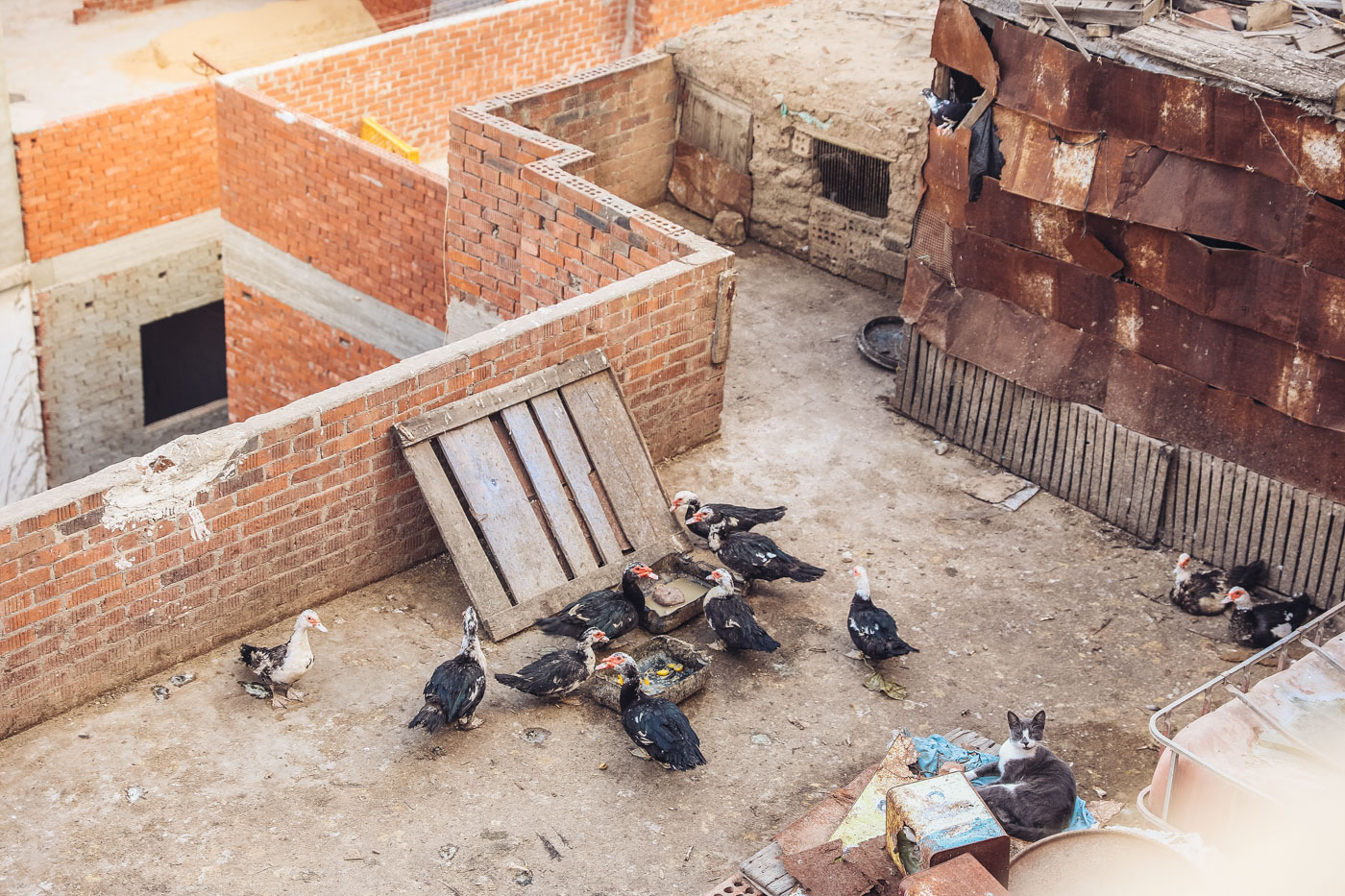
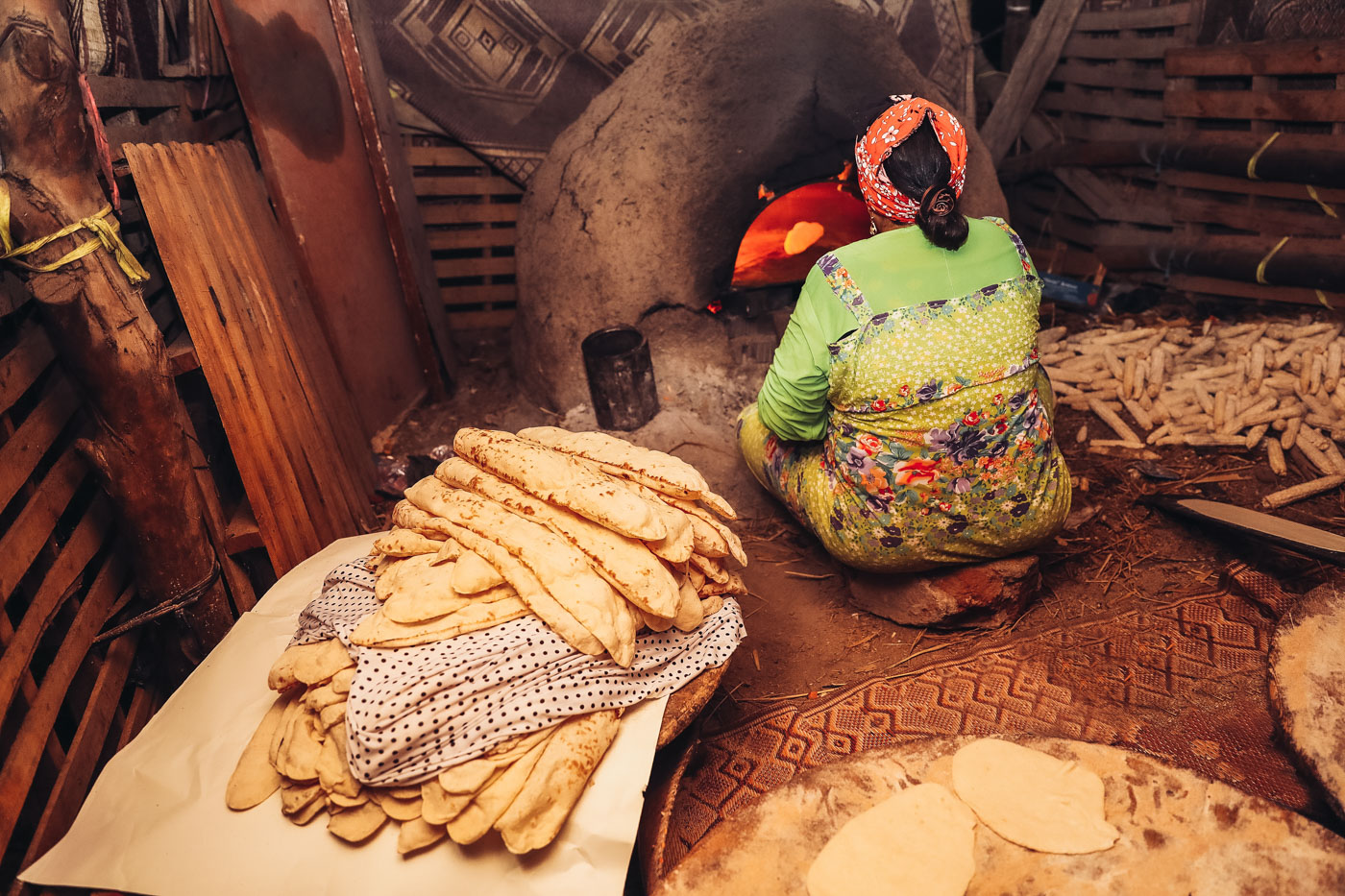
El-Boray and her husband, Mohamed, built their home together. It sits on the eastern bank of the Nile and has enough empty floors to accommodate each of their three sons and their families when the sons eventually marry. Their daughters, too, will marry and move into the family homes of their husbands. While Awish el-Hagar is not as crowded as Egypt’s urban centers, el-Boray and Mohamed used what land they own to build their home and a modest wedding venue from which they run a family business. There is no space left on their property to raise birds, so they keep them on their roof.
Women like el-Boray bear the brunt of responsibility for rooftop animals. El-Boray says her days revolve around the birds, her children, and their home. El-Boray feeds the birds a mix of grain and vegetable scraps from everyday family meals. She administers vaccinations and basic medical care, slaughters, cleans and cooks the birds, and oversees every step of a ceaseless process. Often, her children help. “The kids race each other to the roof to collect eggs,” she says. The boys also catch the birds before slaughter, and the girls help in the kitchen.
The work of maintaining rooftop livestock is uplifting “from a class perspective,” says Fikry. “When [families] raise their own animals on the rooftops, they can eat proteins every day, whether that’s chicken, turkey, duck, rabbit, goat or sheep. They rely on the rooftop for the basic everyday sustenance of the family household.” For families that can afford to purchase meat or poultry from a butcher, Fikry says it’s a “blessing taken for granted.”
The income gap is reflected in data compiled by the Egyptian Initiative for Personal Rights, which found in 2017 that the daily expenditure of wealthy Egyptian city-dwellers amounts to more than one hundred times the daily expenditure of the poorest residents. According to the Egyptian Central Agency for Public Mobilization and Statistics, about one third of the Egyptian population earns less than twenty-one Egyptian pounds ($1.3) per day.
Fikry’s fieldwork took her to working-class and low-income neighborhoods in Cairo, where high-rise multi-family buildings crowd the streets and rooftop space is scarce. In Cairo, families tend to guard their animals more closely against outsiders than those in the less-crowded Delta for fear that a jealous glance could bring the animals harm. This fear stems from a belief in hasad, or the “evil eye,” an idea that if a person envies another person, animal or object, it can cause them misfortune or harm. While the practice differs from one person to the next, it is a general norm in Egypt to be humble about one’s assets and accomplishments and to praise God when complimented to ward off the evil eye. Before she could be invited onto rooftops, Fikry was introduced to families by a close friend of her late grandfather, who had kept geese and other birds on his rooftop during her childhood.
“Their neighborhoods are deemed by the government as dangerous or hazardous, in most cases,” Fikry explains about the ashwa’iyyat where she conducted her fieldwork. In Cairo, ashwa’iyyat, or informal neighborhoods, house an estimated 63% of the population. They are more common now in the urban landscape than the minarets for which Cairo is nicknamed or the stubborn palms that dot the bank of the Nile. Their buildings lurch upward from the ground in haphazard rows, concrete frameworks with bricked walls and paneless windows. “They lack basic services, and everything is precarious,” Fikry says.
The women of the families Fikry connects with during her fieldwork spend their days as el-Boray does, overseeing animals, children, and the home. “Rooftops require nurturing, care, presence and preparation, from sunrise to sunset,” says Fikry. Where residential and commercial spaces mingle, women make agreements with local restaurants to collect leftover food for their rooftop animals. The male breadwinners of families in the ashwa’iyyat hold low-paying positions that keep them out of the house most days. Fikry says one of the men whose families she worked with was a local car mechanic. Another commuted to a more affluent part of the city for janitorial work in a residential building. Jobs like these in the informal sector comprise more than 50% of the Egyptian economy but provide little value and no stability to those who hold them.
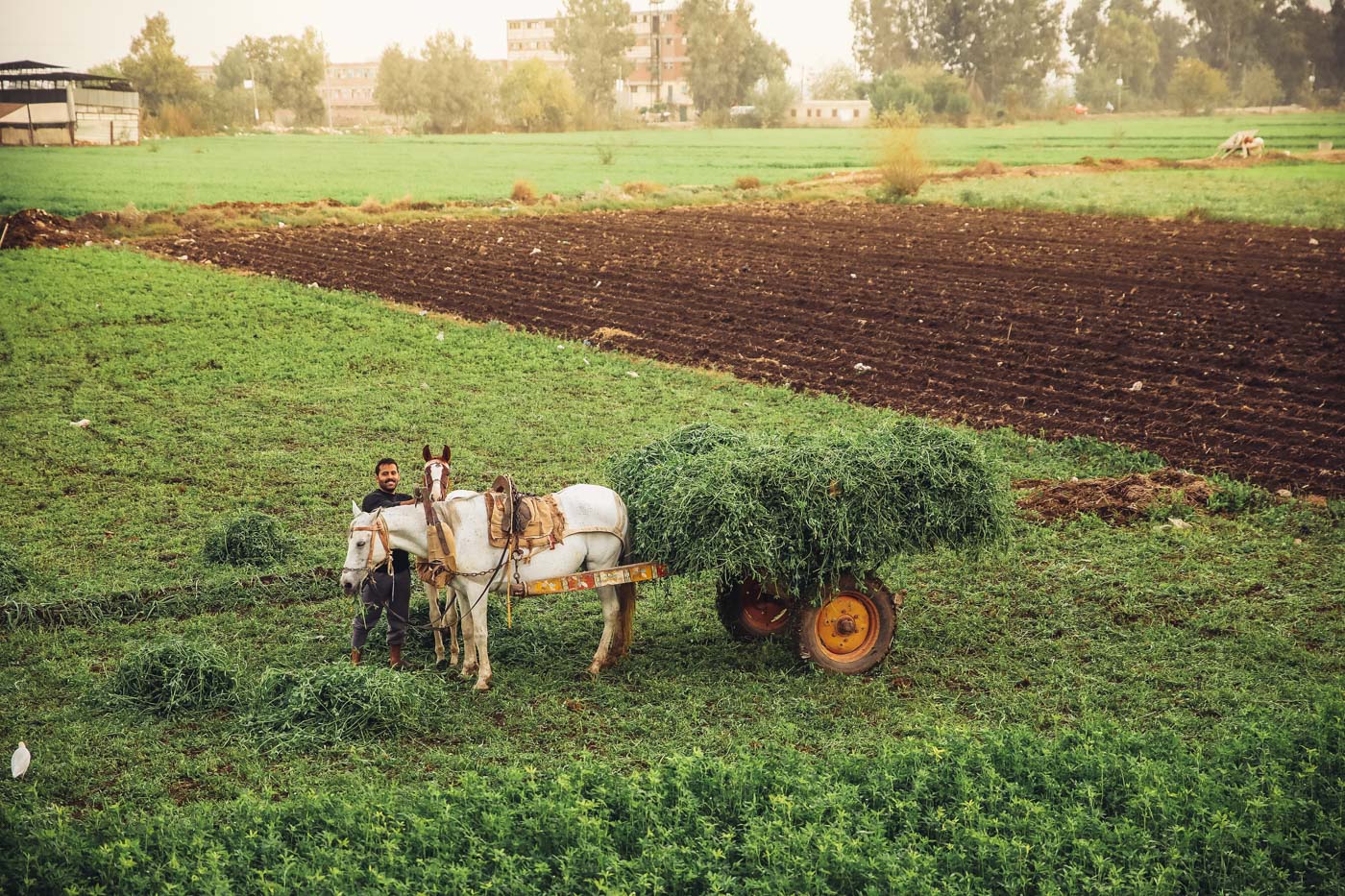
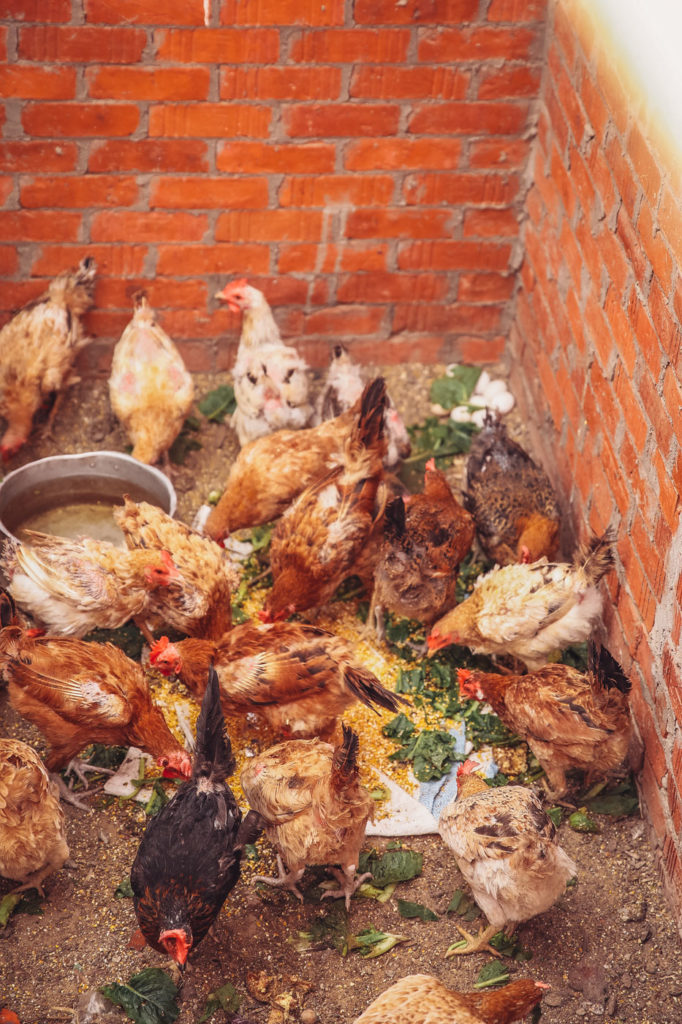
A third man with whom Fikry worked had been retired from government employment for many years, but she says the pension he receives “is nothing. It cannot buy anything.” Likewise, Osama el-Sabaey’s father is a retired postmaster, and he says his parents cannot afford to purchase animal proteins regularly on his pension. El-Sabaey grew up in the Nile Delta but moved to Cairo to study medicine. His parents still live in El-Monshaah el-Kubra, about thirty miles west of Awish el-Hagar.
Growing up, his mother raised and slaughtered ducks, chickens, pigeons, and sometimes rabbits that she kept on the roof of their home. “When we were young, my brother and I would join in,” recalls el-Sabaey. “I would catch the birds for slaughtering, and my brother was interested in pigeons, so he used to care for them daily.” As his mother grew older and the climb to the rooftop became more arduous, she moved her birds to the basement. When el-Sabaey goes to visit, he still sometimes helps catch a chicken or duck for his mother to prepare for lunch. When el-Sabaey’s sister visits from Saudi Arabia, where she now lives with her husband, his mother sends her back with frozen poultry reared in the basement.
Sharing poultry or meat from animals raised on a rooftop or in the basement of a family home is a means of expressing love, explains Fikry. “You share love by giving away a part of what you think is most valuable—namely the animals,” she says. When a woman gets married, her family gives uncooked meat or poultry to the groom’s family as part of a ritual pre-marital gift exchange. Often, gifts of prepared food are also extended outside the family to neighbors and friends in celebration of holidays, as a gesture of thanking God for goodwill, or, “just to share happiness,” says Fikry. No matter the occasion, “It must be grown on the rooftop because it has so much value. They’re not just gifting meat, but gifting meat that has been nurtured with love and care and intimately fed with the leftovers of the household and neighboring stores.”
As Egypt’s population continues to grow, its cities swell outward and upward. The Egyptian working-class gets poorer as political power and wealth concentrate at the top, and their president builds palaces in the desert. Rooftop oases offer respite, and the animals kept there provide sustenance for families that are likely to find little of either elsewhere.





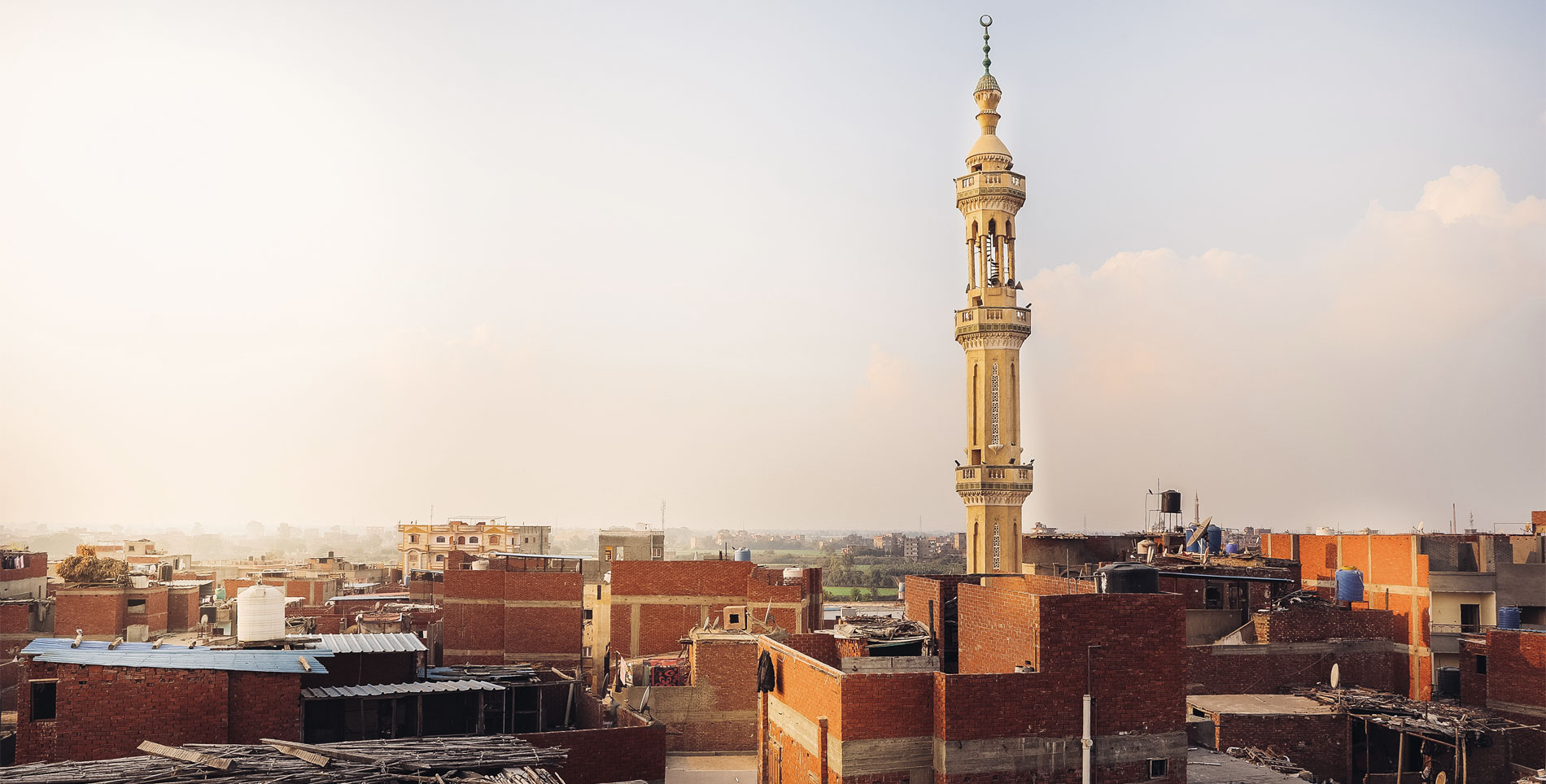

Our comments section is for members only.
Join today to gain exclusive access.